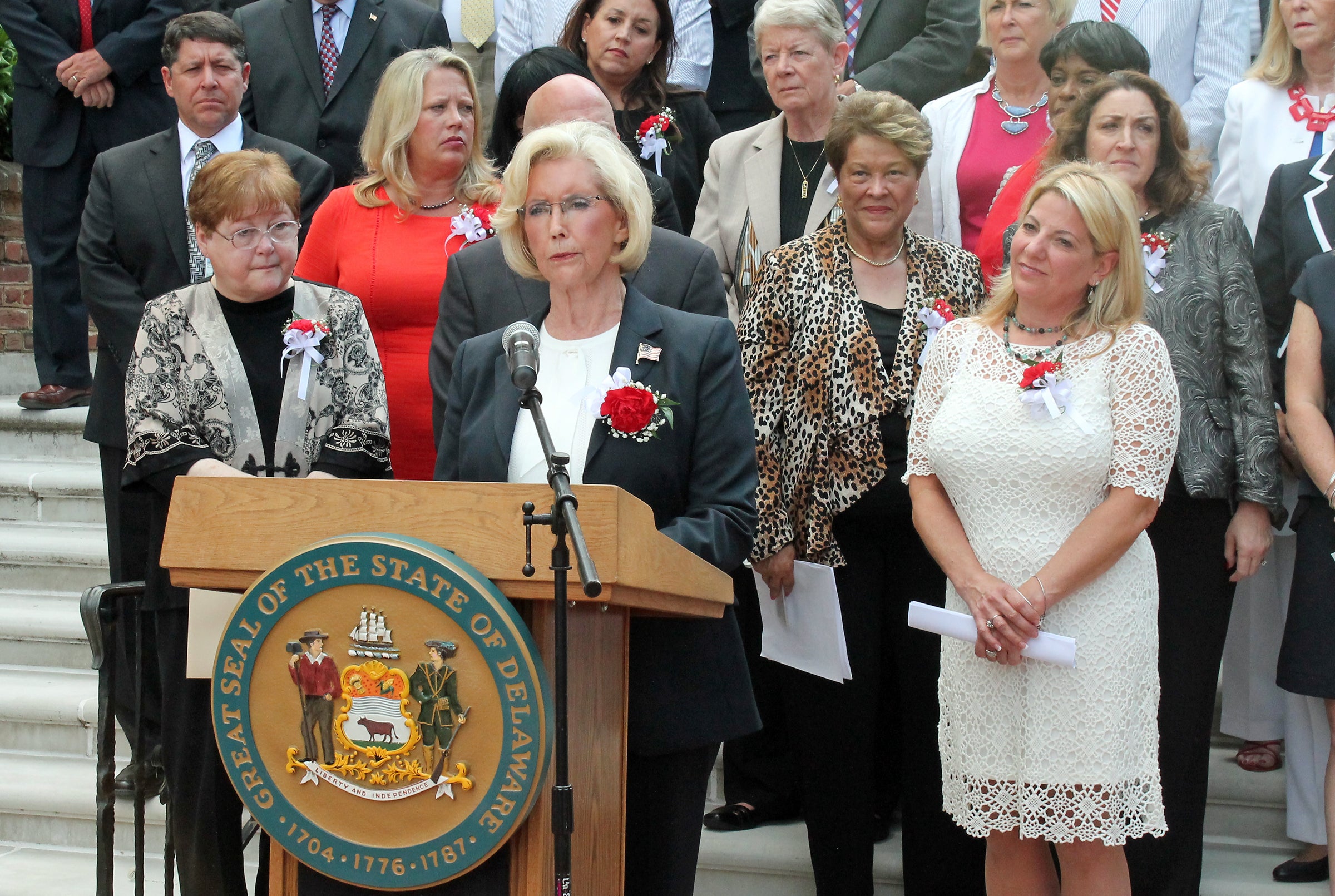Governor Markell signs stronger women’s rights bills into law in Delaware

Women’s rights activist Lilly Ledbetter was the guest of honor during a signing of bills that aim to improve the lives of women. (Courtesy of Doug Denison)
Gov. Jack Markell, D-Delaware, signed several bills into law Thursday addressing issues faced by Delaware women, such as inequality in the workplace, lack of access to healthcare and sexual assault.
The five bills are part of an effort lawmakers began last year to reform justice and public safety, healthcare and employment. Last year the General Assembly passed seven bills focused on improving the lives of women.
The full package of 12 bills were sponsored or co-sponsored by every female member of the General Assembly.
“Today we are here to tell the mothers, daughters and sisters of Delaware we’re allowed to be whoever we want to be, and in our state you can expect to be treated fairly, you can demand equality and you deserve the chance to seize any opportunity that comes your way,” said House Majority Leader Valerie Longhurst, D-Bear.
Women’s rights activist Lilly Ledbetter also joined the lawmakers for the bill signings. Ledbetter’s struggles with pay inequality as a supervisor at an Alabama Goodyear plant led to Congress passing the Lilly Ledbetter Fair Pay Act in 2009.
“I’ve traveled the country continuously and I hear stories every day where women are still discriminated against in their pay and benefits, and this hurts the economy of this country, the community and the nation as a whole,” she said.
Longhurst, who hosted the event, said she believes the legislations will give women the power to speak up about the inequalities they face and seek justice. It also makes clear to employers that discrimination won’t be tolerated.
“I think we realized we need to do some issues in Delaware, and when we started researching other states and what they’re doing we were like, ‘These are common sense bills, why aren’t we addressing wage secrecy pay equality?’” Longhurst said.
“These are issues I thought we were ahead of the game in, and we’re not. We felt it was important to bring these pieces of legislation forward and move Delaware ahead and give our daughters and the ladies of Delaware the opportunity to say, ‘This is what we’re doing for you.’”
Three bills deal with discrimination in the workplace—requiring businesses to be open about salaries, and prohibiting discrimination based on a woman’s reproductive decisions and her caregiver obligations.
Legislation sponsored by Rep. Helene Keeley, D-Wilmington, and Senate Majority Whip Margaret Rose Henry, D-Wilmington, makes it unlawful for an employer to require an employee to keep his or her wages secret.
“There is discrimination—there are just too many women afraid of being fired by not being able to ask the question,” Keeley said. “This bill will allow women who are single moms of children where the fathers are not present in the children’s lives to ask why they’re not being paid on behalf of their children, to show their children the way to become advocates for themselves.”
Legislation known as the “Not My Boss’ Business” bill, sponsored by Rep. Debra Heffernan, D-Bellefonte, and Sen. Nicole Poore, D-New Castle, reinforces a woman’s right to privacy when it comes to her health and reproductive care decisions.
“Those kinds of decisions are incredibly personal,” Poore said. “Deciding whether or not to use birth control is incredibly personal. And that should be a decision made between a doctor and the woman. Not a boss—ever.”
Legislation sponsored by Rep. Kim Williams, D-Newport, and Sen. Patricia Blevins, D-Elsmere, prohibits employers from engaging in discrimination based on an individual’s family caregiver obligations.
“So often, the role of primary caregiver for an aging parent or a child with special needs is filled by a daughter or mother who also has a full-time job,” Williams said. “No one should have to choose between earning a living and making sure that a loved one is cared for properly. Employers should judge people on how well they perform their jobs, not the responsibilities they may have at home.”
Department of Labor Secretary Patrice Gilliam Johnson said her department will review the new laws and create changes, policies and procedures to ensure women’s rights in the workplace. She said she’s not sure how the laws will be enforced yet.
“We’ve been having a number of discussions about what many of the bills will mean for us, but we haven’t sat down to think it all the way through in terms of what kind of change we need to make,” Gilliam Johnson said.
She said women who are discriminated against in the workplace can file a complaint in the department’s anti-discrimination office.
Williams also teamed up with Sen. Karen Peterson, D-Stanton, to require universities to educate its students and staff on sexual assault and options available to sexual assault survivors, and requires the institutions to provide annual reports to the Department of Justice.
“This bill is a step in the right direction, but we need to continue these important discussions among stakeholder groups and work together to develop policies that continue to improve and build on measures that ensure the safety of our college communities,” Williams said.
Sen. Bethany Hall-Long, D-Middletown, and Longhurst sponsored legislation requiring physicians to educate prenatal patients and families on the warning signs and symptoms of postpartum depression.
“Maternal depression is a widespread issue that affects nearly a third of new mothers. No mother should have to face this type of pain and confusion during what should be a joyful and positive experience,” Hall-Long said.
Markell said he believes the legislations are a step in the right direction, and believes the women’s package will continue to evolve.
“The main point is we’re sending a very clear signal,” he said. “First of all in the wage disparity and the idea nobody is allowed to talk about their wages is ridiculous—so I think we’re taking some important steps.”
Legislators say they believe more work is necessary to gain full equality for women, and are confident it will happen in future years.
“For a long time I thought women’s issues were in the rear-view mirror, that people are under the impression everything is okay now and everything is equal now—but we know it’s not, and there’s more work to be done,” said Peterson, who retires this year.
“The work is not done. And to see it continue, especially with many of the young people who worked on the legislations, I leave this place a happy woman because I know the fight will go on.”
WHYY is your source for fact-based, in-depth journalism and information. As a nonprofit organization, we rely on financial support from readers like you. Please give today.





